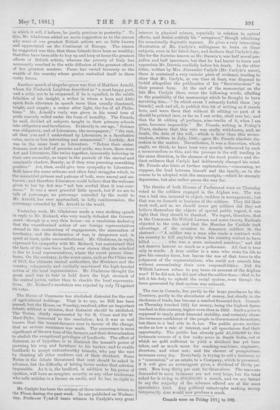Mr. Carlyle has been the subject of three interesting letters
to the Times during the past week. In one published on Wednes- day, Professor Tyndall bears witness to Carlyle's very great interest in physical science, especially in relation to optical effects, and denies entirely his " arrogance," though admitting his occasionally dogmatic manner. He gives a very interesting illustration of Mr. Carlyle's willingness to learn on these subjects, even in his latest days, and declares that Carlyle's dis- like for the doctrine known as Mr. Darwin's,'was half moral pre- judice and half ignorance, but that he had learnt to know and appreciate Mr. Darwin cordially before his death. In the other letter, written by Mrs. Alexander Carlyle (Mr. Carlyle's niece), there is contained a very curious piece of evidence, tending to show that Mr. Carlyle, at one time at least, was disposed to forbid altogether the publication of his "Reminiscences" in their present form. At the end of the manuscript on the late Mrs. Carlyle there occur the following words, alluding to the possibility of the manuscript which be thought to burn surviving him,—" In which event I solemnly forbid them [my friends] each and all, to publish this bit of writing as it stands hero, and warn them that without fit editing no part of it should be printed (nor, so far as I can order, shall ever he) ; and that the lit editing of; perhaps, nine-tenths of it, when I am gone, becomes impossible." Mr. Froude, writing in Friday's Times, declares that this veto was orally withdrawn, and, no doubt, the date of the will,—which is later than this memo- randum, written in July, 1866,—gave Mr. Froude absolute dis- cretion in the matter. Nevertheless, it was a discretion, which ought, we think, to have been very greatly influenced by such a memorandum us this, and the passage in the will tending iu the same direction, in the absence of the most positive and dis- tinct evidence that Carlyle had deliberately changed his mind.
Mr. Froude also hints at further explanations,-concerning, we suppose, the feud between himself and the family, as to the course to be adopted. with the manuscripts,—which he strongly deprecates, but also rather paves the way for.


































 Previous page
Previous page